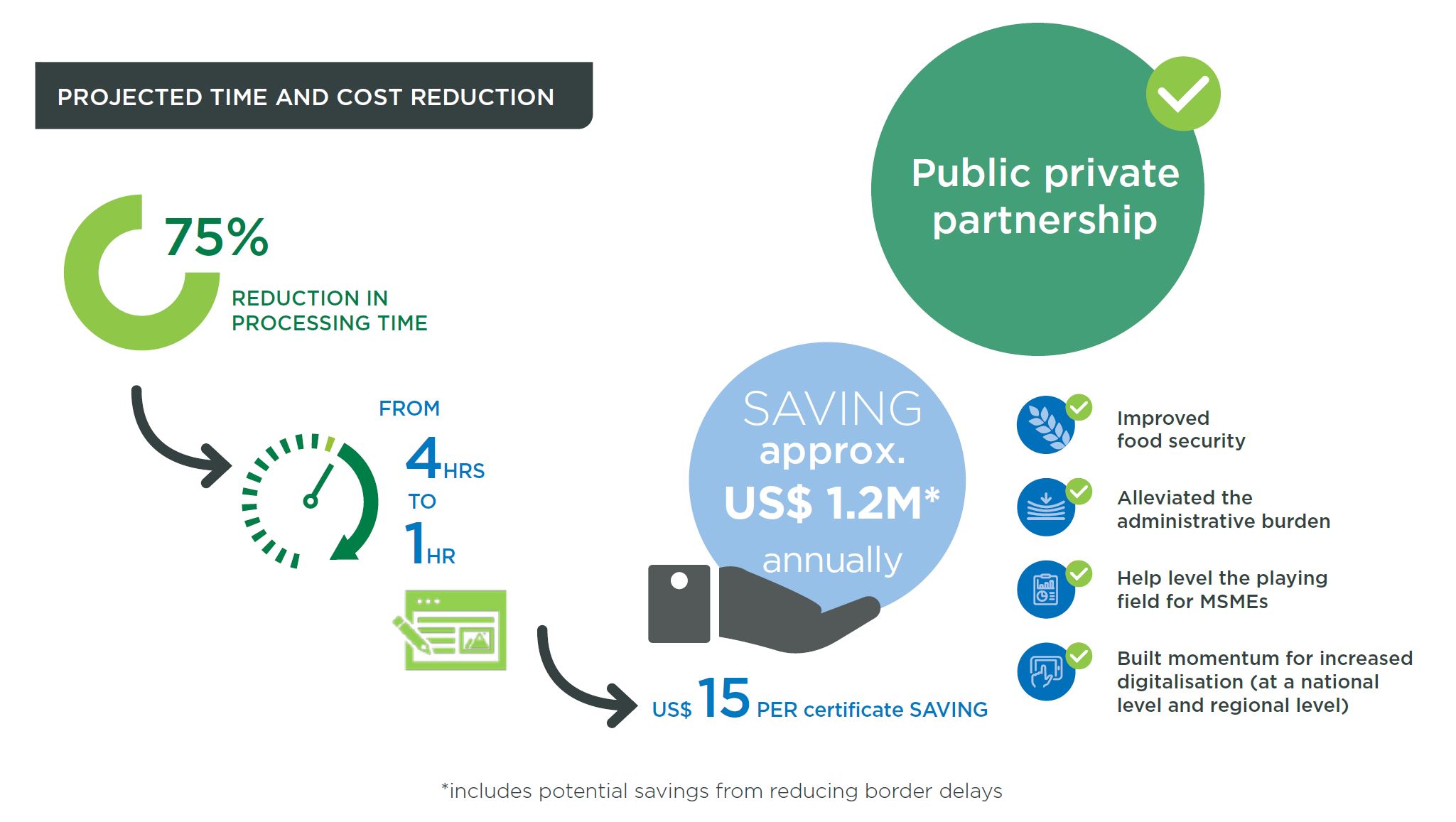Jordan
Achieved
Adopting electronic phytosanitary exchange
Modernising certification process boosts trade
The Impacts
The full adoption of the IPPC ePhyto Solution, mandatory since February 2023. supports trade facilitation in Jordan, benefiting the economy, exporters, importers, and producers.
In addition to projected savings of 150,000 hours and over US $1 million annually, digitalising the phytosanitary certification process will:
- ensure the quick, accurate, low-cost exchange of phytosanitary certificates, producing time and cost savings for traders while alleviating the administrative burden on authorities
- enhance Jordan’s global trade competitiveness by allowing the agricultural sector to conform to international standards
- contribute to food security by ensuring that produce is not delayed at border checkpoints
- help to level the playing field for micro, small and medium enterprises (MSMEs) by introducing processes that lower barriers to trade.
The success of the project has encouraged interest from other Middle Eastern countries seeking to adopt the IPPC ePhyto Solution. This positive development may lead to increased efficiencies in the Gulf, including countries like Saudi Arabia, United Arab Emirates and Oman who are not yet members of the IPPC ePhyto Hub. Benefits will grow exponentially as main trading partners join the Hub.
Finally, strong engagement from the public sector improved private sector trust in the reform process, building momentum and demand for further digitalisation in the country.
The Challenge
A phytosanitary certificate is a legal document issued by a country’s National Plant Protection Organisation (NPPO) for exports of plants and goods of plant origin certifying that they are free of specific pests and diseases.
Jordan had already taken significant steps towards automating its phytosanitary certificate procedures prior to deciding to adopt the IPPC ePhyto Solution, but the process remained paper based. Traders still had to spend at least four hours – and often much longer – in submitting, paying for, and collecting the required certificate.
This increased time and cost for every trader and was especially discouraging for resource-poor MSMEs who would typically have had to return a second time to an NPPO office to collect a certificate, rather than face an uncertain wait.
The next steps created more worry. The exporter had to post, courier, or send the certificate with the relevant shipment. It would pass through many hands and possible alterations along the way, making it prone to error, loss, and fraud. Also, rejection at the port of entry meant the original certificate had to be returned to the country of origin for amendments. In the meantime, exporters were likely to incur additional storage costs, spoilage, and frustrated customers.
Exporters could also expect their goods to be held at Jordanian borders for 3.5 days in cases where clerical issues arose.
Delays such as these damage competitiveness and in the event of spoilage, they also undermine food security, while potentially dampening international demand and compromising Government ambitions to position the country as a premium agri-food producer.
What We Did
The Alliance supported Jordan in introducing the generic IPPC ePhyto Solution, and the preparation for a future launch of the platform in the Arabic Language, through public private partnership involving relevant stakeholders, including:
- Ministry of Agriculture (MoA)
- Ministry of Industry, Trade and Supply (MoITS)
- Jordan Customs
- Jordan Chamber of Commerce (JCC)
- Jordan Exporters and Producers for Fruit and Vegetables (JEPA)
- Local MSMEs
Following successful integration into the IPPC ePhyto Hub, more than 100 officials in various locations participated in training sessions in preparation for roll-out. In tandem, the project private sector partners− JEPA, JCC as well as Jordan Dates Association−cooperated in the training of their members and traders. Local MSMES had significant input into piloting test exchanges with IPPC ePhyto Hub member countries.
Change Management
Based on the Alliance’s experience in implementing the IPPC ePhyto Solution in other countries in recent years, the Alliance conducted a change management programme to make transitioning to the new system as straightforward as possible for all users. This involved collaborative meetings through public private dialogues (PPDs), workshops, and user training sessions.
Public private partnership
Local business played a pivotal role – five companies piloted the new system with a 100% exchange success rate. Both public and private sectors participated in a series of workshops before, during and after implementation.
Knowledge exchange
The Alliance helped to organise a study tour to The Netherlands for a delegation comprising Ministry of Agriculture, Ministry of Digital Economy and Entrepreneurship, and Customs officials. Over two days, they met experts from The Netherlands Food and Consumer Product Safety Authority to learn about the benefits first-hand of transitioning to electronic certification, while sharing the Jordanian experience and challenges.
Electronic exchanges & ePayment
With the support of the project, the Ministry of agriculture adapted its regulations to allow for the issuance and exchange of electronic certificates.
Additionally, and to further increase time and cost savings by removing the need for in-person payment for certificates at government departments, the Customs authorities started collecting the certificates due fees through their electronic system on behalf of the Ministry of Agriculture.

Get involved
Find out more about how to get involved with the Alliance. Click on the relevant icon: